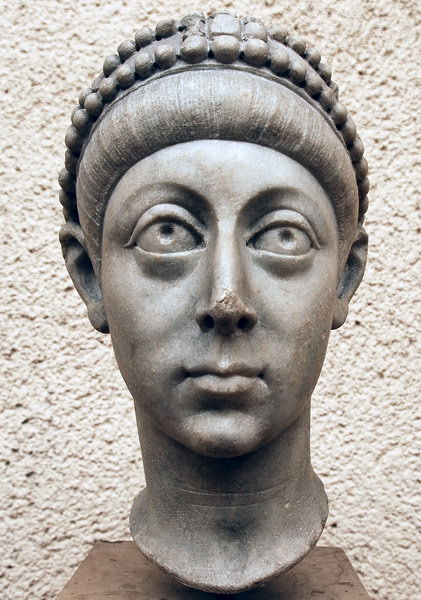Synesius, On Imperial Rule 19
 In his speech On Imperial Rule (or On Monarchy), Synesius of Cyrene offers some advise to the emperor Arcadius (r.395-408). More information about this speech, together with a brief summary, can be found here.
In his speech On Imperial Rule (or On Monarchy), Synesius of Cyrene offers some advise to the emperor Arcadius (r.395-408). More information about this speech, together with a brief summary, can be found here.
Throughout this speech, the word "Scythians" refers to the Tervingian Germans (who would later be known as Visigoths), whereas "king" refers to emperor.
The text is offered here in the translation by A. Fitzgerald. The four-digit numbers are page numbers of the Migne edition.
On Imperial Rule 19
[1] [1100] It is my no means a kingly treat to exhaust cities levying taxes, for to the good king of what use are great possessions? [1101] He does not through vanity of disposition descend to costly activities, nor does he display a vainglorious prodigality in place of a prudent use of his means. He is not the puerile character which would sacrifice the sweat of the honest toilers to the amusements of the stage. He will not have to face the necessity of frequent wars which, as the Lacedaemonians say, 'feed on more than their rations;'note for my argument has shown that the good king may be mastered neither by plot nor by attack.
[2] If the objects, therefore, for which he needs taxes have been cut down by him, he stands in no need of a surplus. He can become a most harmless collector of these revenues by canceling the inevitable deficits and by being satisfied with the imposition of such amounts as are commensurate with the means of the taxpayers; but a king who is greedy of money is more shameful than a huckster. The latter, at all events, relieves the want in his own house; but the evil disposition of the former is inexcusable.
[3] For my own part, when I review, as I often do, each one of our passions and consider what sort of men they present us with, men completely engrossed by them, I seem to myself to observe, even among private individuals, that this tribe of business people is the most sordid, the most malicious, the most downright niggardly of all men,note and capable of finding a place, not in all respects dishonorable, only in a decaying country. Nay, they themselves are the first to suffer contempt in their own consciences, inasmuch as they have made plans contrary to the purpose of Nature in respect to what is first and what is last. For she ordained the body to be in the service of the soul,note and the things without to be for the use of the body, and to this last she gave secondary things, but these men class both soul and body with the third element. Dishonoring themselves, therefore, and reducing the ruling power within them to slavery, how could such men either do or plan anything further that is great and noble? When I define them as more ignoble than ants, and more small-minded, I am not ashamed before Truth; for the ants measure their provisions by the needs of life, but these men think fit to measure life by their need of provision.
[4] This dreadful plague must therefore be driven away from the king himself and his subjects alike, that a good king may rule over good subjects; and zeal for virtue must be introduced in its place. In this struggle for virtue let the king himself become both the champion and the umpire.
[5] It is shameful, as someone has said, that there should be public javelin contests and competitions in boxing, and wreaths of victory awarded to the victors in these contests, and that none should enter competitions in self-control, none in virtue.note It is probable, I think, nay, more than probable, it is quite certain that the cities which followed such a policy on the part of their king as this would lead the life of the fabled Golden Age of yore, having no time for evil, but leisure for good and, in the first place, for piety.
[6] The king himself will lead us to this virtue, seeking from a divine source the direction of every deed, whether great or small. More wondrous than all else is it, methinks, to hear or to behold the king when, in the midst of his people, he holds up his hands and bends his knee before that King who is at once his own and that of his people.note [1104] And it is reasonable to assume that the Divinity will be rejoiced when glorified by devotion from a pious king, and will make such an one His own in sacred union.
[7] Thus, in addition to being a lover of God, he becomes more than all a lover of man, for he shows himself to his subjects in the image of the King by whom he is ruled. In such a state as this, what needful thing is likely to be wanting? But my discourse must return to the subject of a moment ago.